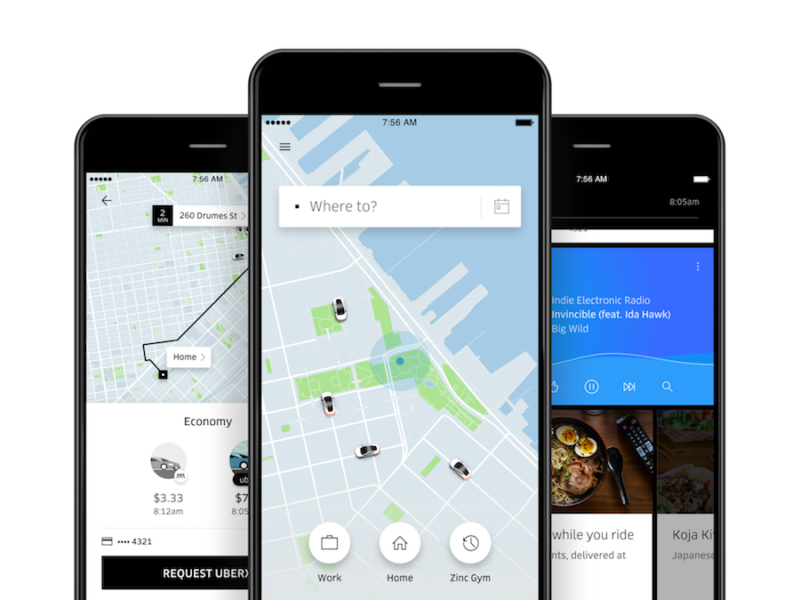Uber drivers, even those doing rideshare driving as a side-gig, are considered to be earning income through self-employment. Just like other self-employed independent contractors, they face some critical startup decisions—including what business entity type to choose for their business.
After signing the Uber contract to designate themselves as a self-employed private contractor, Uber drivers face the decision of what type of business structure they should operate under.
They shouldn’t take this lightly, because the business structure chosen will affect their tax obligations and degree of personal liability.
When Uber drivers don’t establish a formal business entity for their rideshare driving, they are, by default, classified as sole proprietors. Operating as such is inexpensive and straightforward, but would an LLC be a better choice?
Before we explore some of the potential benefits of the LLC structure as they relate to being an Uber driver, here’s a quick overview of what an LLC is:
LLC stands for “Limited Liability Company.” An LLC is a legal business entity that is formed according to state rules and regulations. It is a sort of hybrid between a sole proprietorship (or partnership) and a corporation in that it provides personal liability protection for business owners (also known as “members”) and allows for the business to receive either pass-through taxation or corporate tax treatment.
What Benefits Does an LLC Offer Uber Drivers?
1. LLC Liability Protection for Uber Drivers
The LLC business structure creates a separation between businesses and their owners. Operating as an LLC limits Uber drivers’ personal responsibility for debts and legal liabilities of their business.
According to the Rideshare Guy blog:
Most rideshare drivers won’t need to worry about the debt protection aspect of an LLC because you won’t be able to get a loan against the value of your LLC anyways. In order to get a business loan, you would likely have to put up personal assets as collateral so that type of personal debt protection wouldn’t apply.
However, the LLC structure can offer a great deal of peace of mind with regard to potential legal claims. If someone were to sue an Uber driver, the driver’s individual assets (personal bank accounts, retirement savings, house, etc.) would be protected from being taken as restitution.
However, realize that Uber drivers’ personal assets might still be at risk if they are found guilty of personal wrong-doing or negligence.
2. Potential LLC Tax Advantages for Uber Drivers
Because Uber drivers are not employees of Uber, they must report their income from ridesharing trips to the IRS, the state, and local jurisdiction—and pay applicable income taxes on that income.
Uber drivers that operate as sole proprietors receive pass-through taxation, meaning that all business profits and losses flow through to the individual’s income tax return and are taxed at the appropriate individual income tax rate. That income is also subject to self-employment taxes (Medicare and Social Security).
For some Uber drivers, that can result in a lofty tax burden, and it typically requires making quarterly estimated income tax payments to the U.S. Department of Treasury, the state, and sometimes the county.
With the LLC business structure, Uber drivers have other tax treatment options available to them:
- Corporate taxation
- S Corporation Election
Note that regarding state income tax, most states will follow the federal tax treatment methodology. I recommend checking with the state’s Secretary of State office to determine if any additional state fees (such as a franchise tax) will apply.
What Happens When an Uber Driver’s LLC Is Taxed as a Corporation?
- With corporate tax treatment, the Uber driver’s LLC must file its own tax returns and pay income tax at the applicable corporate tax rate.
- Income paid to the LLC’s members (in the case of an Uber driver, that would likely be only the Uber driver) as salaries are subject to income tax at the corporate rate.
- Then, that income gets taxed again at the individual’s tax rate on the driver’s personal income tax return.
- Although double taxation sounds ominous, in some instances it might be more financially advantageous than pass-through taxation. It depends on how the individual and corporate tax rates compare and other factors.
A tax advisor or accountant can help you assess your situation and make an informed decision.
What Happens When an Uber Driver’s LLC is Taxed as an S Corporation?
Uber drivers who want a tax option that’s somewhere in the middle will want to learn more about the S Corp election. As an S Corporation, an Uber driver’s LLC with corporate tax treatment can elect to have its business income flow through to its member’s (the Uber driver’s) individual tax return, but only the Uber driver’s salaries and wages are subject to self-employment taxes—business profits paid as distributions are not. Because S Corp tax treatment helps drivers minimize their personal tax burden while avoiding corporate double taxation, it might be worth a look!
As I mentioned earlier, many different considerations come into play when determining which business structure will provide the most favorable tax outcomes. It can be tricky, so the guidance of a tax expert is of the utmost importance when evaluating your options.
Other Tax-Related Concerns for Uber Drivers
According to the Ridesharing Driver blog:
Neither Uber nor Lyft makes it totally clear how to have your earnings filed under your Employer ID Number (EIN) or another tax ID. And after you do figure out how to navigate each Uber & Lyft’s tax reporting system, there’s often not a lot of reassurance that you’ve done it right and everything will be correctly reported at tax time.
It’s crucial to give Uber the correct information on their W-9 form so that they are aware of your business entity type and your correct taxpayer ID (social security number or EIN).
Uber drivers who have formed an LLC or incorporated can gain some peace of mind by consulting an accountant or tax advisor that has experience in preparing taxes for ridesharing drivers.
3. Minimal LLC Compliance Requirements
LLC compliance requirements vary from one state to the next, but Uber drivers (no matter where they operate) are likely to find them relatively simple. To form an LLC, Uber drivers will have less initial registration paperwork and fewer ongoing filings and reports than if they decided to operate as a corporation.
What Steps Should Uber Drivers Take to Form an LLC?
I’ve listed the basic steps that Uber drivers would follow to establish an LLC. They are similar to those for businesses in other industries. State and local requirements will vary depending on where a driver will be operating the LLC.
- Decide on a business name.
- Designate a Registered Agent – i.e., a business or individual in the state authorized to receive service of process on the LLC’s behalf.
- File Articles of Organization and register an LLC with the state.
- Obtain an EIN (Employer Identification Number).
- Write an LLC Operating Agreement.
- Have a valid driver’s license and, if required, a business license.
- Open a business bank account. Moreover, don’t commingle the LLC’s funds with personal assets.
- Fulfill ongoing business compliance responsibilities required by the state and local jurisdictions.
Additional Resources for Uber Drivers
If you’re thinking of becoming an Uber driver or are already one, consider tapping the following resources for information and assistance:
- Attorneys and tax experts – It’s invaluable to have professional guidance from someone with knowledge and experience in helping rideshare drivers navigate the questions and challenges that come with self-employment. Besides helping to determine the best business entity type, they can assist with other critical decisions, too.
- Industry Experts – Uber drivers and aspiring rideshare drivers can also find helpful information on the following websites: The Rideshare Guy, Ridesharing Driver, Ridester
- CorpNet.com – If you’re an Uber driver that is ready to move with forming your LLC, CorpNet is here to save you time and money when completing and submitting your registration documents and other filings.





